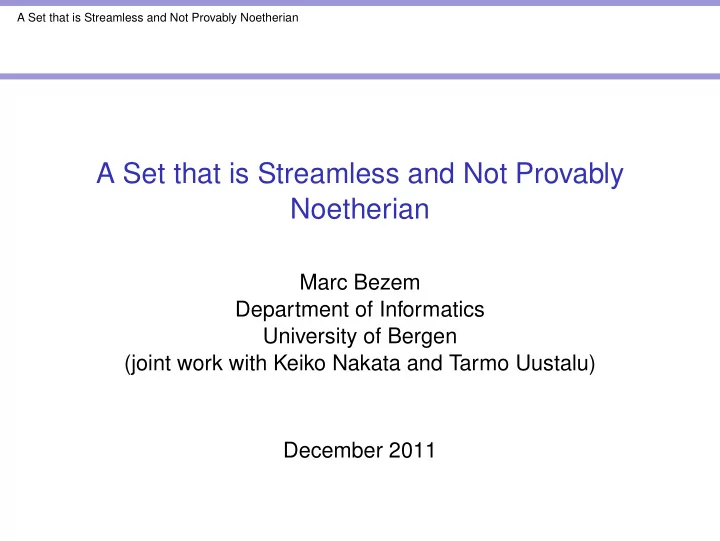

A Set that is Streamless and Not Provably Noetherian A Set that is Streamless and Not Provably Noetherian Marc Bezem Department of Informatics University of Bergen (joint work with Keiko Nakata and Tarmo Uustalu) December 2011
A Set that is Streamless and Not Provably Noetherian Overview ◮ Topic: constructive ‘finiteness’ of sets A ⊆ N ◮ Prerequisite: elementary intuitionistic reasoning ◮ Prerequisite: elementary recursion theory ◮ Definition of streamless set ◮ Definition of noetherian set ◮ Comparing ‘streamless’ to ‘noetherian’ ◮ Conjecture by Coquand and Spiwack
A Set that is Streamless and Not Provably Noetherian Finiteness ◮ Ubiquitous: ◮ Reasoning about termination ◮ Reasoning using fairness (‘eventually’) ◮ Infinite combinatorics (PHP , Ramsey, Higman, ...) ◮ Recently: initial algebra of a certain functor having the Cantor space as final co-algebra (Escardo, Bauer). ◮ Classically: surprisingly unproblematic (not FO-def.) ◮ Constructively: the obvious ‘comprehensive list of elements’ often inadequate (f.e. fairness, ‘Aussonderung’)
A Set that is Streamless and Not Provably Noetherian Finiteness, variants ◮ Knowing all the finitely many elements of A ⊆ N ◮ Knowing the exact number of elements of (undecidable) A ◮ Knowing an upper bound on the number of elements of A ◮ Not knowing an upper bound, yet knowing that A is finite (!) ◮ Less attractive: doubly negated variants
A Set that is Streamless and Not Provably Noetherian Streamless and Noetherian ◮ For A ⊆ N , for our purposes, streams s : str A := N → A ◮ For A ⊆ N , lists ℓ : list A as usual ( �� , :: ) ◮ For both lists and streams, dup for having duplicates ◮ Streamless A := ∀ s : strA . dup s ◮ Noetherian A := Acc A �� , where: dup ℓ ∀ a : A Acc A a :: ℓ Acc A ℓ Acc A ℓ
A Set that is Streamless and Not Provably Noetherian Noetherian vs. Streamless Let A be noetherian, that is, Acc A �� . Prove by induction that Acc A ℓ implies dup s for all s : str A extending reversed ℓ : dup ℓ ∀ a : A Acc A a :: ℓ Acc A ℓ Acc A ℓ Let A be streamless: ∀ s : strA . dup s . How to prove Acc A �� ? ◮ By classical logic (and dependent choice) ◮ By bar induction ( dup is the bar) NB Bar induction fails in recursive analysis (by the Kleene tree)
A Set that is Streamless and Not Provably Noetherian Elementary Recursion Theory ◮ Kleene-brackets (universal machine): {·}· ◮ Church’s Thesis: every stream over N has a Kleene-index CT := ∀ s : str N . ∃ i : N . ∀ n : N . s ( n ) = { i } n ◮ Halting set H := { n : N | { n } n ↓} ◮ Bitstring b approximates H means: k ∈ H ⇐ ⇒ b k = 1 , for all k < lth ( b ) ◮ Bitstrings are encoded as natural numbers
A Set that is Streamless and Not Provably Noetherian Streamless But Not Provably Noetherian ◮ Define: A := { b ∈ N | CT ∧ b approximates H } ◮ Classically: A empty ◮ Constructively: empty bitstring ∈ A ⇐ ⇒ CT ◮ NB1: if s stream over A , then CT ◮ NB2: if a , b ∈ A and lth ( a ) ≤ lth ( b ) , then a � b
A Set that is Streamless and Not Provably Noetherian Streamless A Define partial recursive ϕ ( x , y ) as follows: Compute { x } 0 , . . . , { x } ( y + 1 ) and decode these as bitstrings. Let b = { x } n be the first of these having maximal length. � ↑ if b y = 1 ϕ ( x , y ) ≃ 0 if b y = 0 provided lth ( b ) > y , otherwise put ϕ ( x , y ) = 0 (irrelevant). By the S-n-m Theorem there exists a total recursive f such that { f ( x ) } y ≃ ϕ ( x , y ) . If s is a stream over A , then s has Kleene-index i and there is a duplicate among s ( 0 ) , . . . , s ( f ( i ) + 1 ) . Details on blackboard.
A Set that is Streamless and Not Provably Noetherian Not Provable: Noetherian A We prove Acc A �� = ⇒ ¬ CT . Assume Acc A �� ∧ CT and let S be the set of all lists of bitstrings containing some bitstring twice or more. Then, S is closed under the rules defining Acc A ⊆ list A : dup ℓ ∀ a : A a :: ℓ ∈ S ℓ ∈ S ℓ ∈ S For the left rule this is obvious. For the right rule, assume ∀ a : A a :: ℓ ∈ S for some ℓ : list A . Let b be the longest bitstring in ℓ . Let bi be b extended by i = 0 , 1. By construction we have that bi :: ℓ ∈ S implies ℓ ∈ S . By contraposition we get that ℓ / ∈ S implies bi :: ℓ / ∈ S , so bi / ∈ A , i = 0 , 1, as ∀ a : A a :: ℓ ∈ S . Having CT (only needed for ℓ = �� ), this is absurd (details on blackboard). Hence ¬ ℓ / ∈ S and so ℓ ∈ S , as this is decidable. Now Acc A �� implies �� ∈ S , absurd, so Acc A �� = ⇒ ¬ CT .
Recommend
More recommend